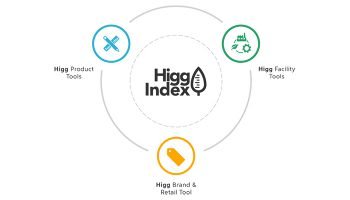 The Sustainable Apparel Coalition (SAC) and Higg, which implements and supports unified sustainability measurement tools, has launched the Higg Product Module (Higg PM), a sustainability tool that assesses the environmental impact of manufactured products. The launch of the Higg PM rounds out the core suite of tools on the Higg Index platform, Higg.org. With methodology developed by the SAC and technology provided by Higg, the Higg PM reflects the work and expertise of more than 70 SAC member companies over nearly four years.
The Sustainable Apparel Coalition (SAC) and Higg, which implements and supports unified sustainability measurement tools, has launched the Higg Product Module (Higg PM), a sustainability tool that assesses the environmental impact of manufactured products. The launch of the Higg PM rounds out the core suite of tools on the Higg Index platform, Higg.org. With methodology developed by the SAC and technology provided by Higg, the Higg PM reflects the work and expertise of more than 70 SAC member companies over nearly four years.
The Higg PM is a life cycle assessment tool that guides brands, retailers, and manufacturers to calculate product and supply chain performance in five environmental impact categories: global warming potential, water scarcity, eutrophication, fossil fuel resource depletion, and chemistry. The Higg PM will be released in two phases. The first edition offers product assessment from cradle to factory gate, including materials production. It measures impacts from the point of resource extraction to finished product assembly. The second edition, currently in development and expected to launch in early 2021, will further expands assessments to include retail and packaging, distribution, product care, duration of service, and end of use, according to a press release by SAC.
The core Higg Index suite features five tools that measure social and environmental sustainability management across the value chain. The tools take a holistic approach to measuring and tracking sustainability performance rather than looking at siloed metrics. Use of Higg Index tools helps companies understand and benchmark their impacts so they can improve sustainability management and performance practices year on year.
In this first phase, companies can use the Higg PM to communicate materials data information with value chain partners. The Higg PM is integrated with the Higg Materials Sustainability Index (Higg MSI) on the Higg.org platform. With the new tool, Tier 2 manufacturers share materials and data with Tier 1 manufacturers and brands that use the Higg MSI, improving transparency and communication and strengthening relationships between value chain partners. The Higg PM uses Higg MSI data to calculate the environmental impacts of the materials in the products companies design and manufacture. This first edition of the Higg PM tool also allows companies to calculate Scope 3 greenhouse gas emissions from purchased goods and services, aligning with Category 1 of the greenhouse gas protocol. This measurement is instrumental in supporting companies as they track progress towards their science-based targets and other environmental goals.
Following a spinout from the SAC last May, technology company Higg has quickly delivered state of the art technology to serve the apparel industry at global scale. The release of the Higg PM follows last month’s release of the updated Higg MSI and the Higg Brand & Retail Module (Higg BRM) in April 2020.
As global interest in sustainability continues to grow, the SAC has been closely involved in discussions around potential sustainability regulation. The Higg PM builds on environmental sustainability work started by the EU Commission in 2013 for its Product Environmental Footprint (PEF) effort. The Higg PM will aim to support EU efforts to provide brands a trusted tool to calculate their environmental footprint, helping brands and manufacturers prepare for future policy changes.
Companies anticipate they will eventually need to back up sustainability claims in Europe and beyond, with a standard methodology, which the Higg PM offers. Once the PEF methodology is finalised, it will also be implemented as part of the Higg PM to ensure alignment and compatibility with the anticipated EU standard. Brands, retailers, and manufacturers with interests in the European market can use the Higg PM before that time to prepare for future requirements. Those that use the Higg PM will have a head start on data collection and have a better sense of Product Environmental Footprint Category Rules results they could expect.
Like all Higg Index tools, the Higg PM will continue to expand over time as more robust data emerges and cutting-edge science evolves. The availability of trusted, scientific data will be instrumental to advancing the tool’s capabilities. Such data will help the industry begin to assess other sustainability practices including circularity more effectively. The second edition of the Higg PM will enable assessment of a product’s impacts through its end of use and offer companies insight into circularity opportunities within their sustainability programmes.





















